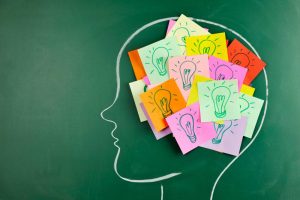 Have you ever heard Churchill’s famous phrase “Who owns information, owns the world”? In our century, in order to succeed, you need to keep in your head an incredibly huge amount of data: names, phone numbers, addresses, logins, passwords, etc.
Have you ever heard Churchill’s famous phrase “Who owns information, owns the world”? In our century, in order to succeed, you need to keep in your head an incredibly huge amount of data: names, phone numbers, addresses, logins, passwords, etc.
Of course, for convenience, you can use a notebook or a diary, but sometimes life is so dynamic that it is not possible to use the records. What to do if you need to recollect important information? The best way is to use the memory! Here you will find out more about the simple and effective ways to develop and train your memory so that at the right time it does not fail.
Contents
- Tip number 1: Create associations
- Tip number 2: Say words backwards
- Tip number 3: Try to use your left hand more often
- Tip number 4: Use your mobile gadgets wisely
- Tip number 5: Recollect how you spent your day yesterday
- Tip number 6: Have a good sleep regularly
- Tip number 7: Learn foreign languages
- Top-10 Things You Should Do to Improve Memory Quickly
- Video
Rule number 1: Don’t eat 2 hours before going to bed
 The practice of creating associations is the oldest of all methods of mnemonics – the science, which studies the mechanism of memory, which has been used since the 16th century thanks to the philosopher of the Renaissance Giordano Bruno.
The practice of creating associations is the oldest of all methods of mnemonics – the science, which studies the mechanism of memory, which has been used since the 16th century thanks to the philosopher of the Renaissance Giordano Bruno.
He wrote a treatise “About drawing up images, signs and ideas,” in which he held associations between the world of magical symbols (inner circle), the world of nature (medium) and the world of the arts (outer circle). Unfortunately, his works were not approved and Giordano became a victim of the inquisitor’s fire. The main secret of classical mnemonics is simple. When a person in his imagination connects several visual images, the brain fixes this relationship. In the future, it’s enough to remember one of them, and the memory will show you the rest.
The method of associations is the first and the main method of memory development, which must be mastered, as it is functional not only in itself, but also is an integral part of most methods of effective memorization. Without this method it is impossible to imagine any technique of memorization, just as it is impossible to imagine mathematics without numbers.
If you ask several people to say the first word that comes to mind when they hear the word “red” (in other words, ask what word is associated with the word “red”), you can get answers like “poppy”, “flag”, “tomato”, ” “blood”, etc. Such differences depend primarily on the individual experience of each person. The above described associations are called free, they are already formed in your mind. And for mastering the very method of associations, you will need to learn how to create new associations (or links) between any elements (words, numbers, symbols, etc.).
Take into account that:
- The more banal and boring your associations are, the less likely is their effective help.
- On the contrary, the more unconventional and even, perhaps, absurd the connection between the elements, the stronger it is.
- Even better, if your associations are ridiculous and ridiculous. It’s not for nothing that we cannot remember the previous Tuesday, but we clearly remember the holidays, the birthdays of ten years ago, that is, everything that somehow comes out of the ordinary life.
Important: It is recommended to train your associative memory daily by doing special exercises, for example, take several words and try to find some connection between them.
Tip number 2: Say words backwards
 Pronounce the words backwards. Let’s move away from the classics and turn to modern techniques. To train memory in everyday conditions, scientists advise reading the words backwards. And, not from the paper, but from the head. Start with the simple. Write on paper a few words, for example, “picture”, “ceiling”, “love”. And then, despite the notes, read them on the contrary. Primitive, at first glance, exercise – an excellent simulator for visual memory.
Pronounce the words backwards. Let’s move away from the classics and turn to modern techniques. To train memory in everyday conditions, scientists advise reading the words backwards. And, not from the paper, but from the head. Start with the simple. Write on paper a few words, for example, “picture”, “ceiling”, “love”. And then, despite the notes, read them on the contrary. Primitive, at first glance, exercise – an excellent simulator for visual memory.
It’s not so simple without the skill to keep the word “megalopolis”, “chess” in the imagination. To succeed, break the words into fragments. For example, “me-ga-po-lis”. If four syllables are already fixed in front of your mind’s eye, it will not be difficult to repeat them backwards. This exercise perfectly develops memory and attention.
- Read the text in the usual way, then backwards.
- Watch how the reading speed changes.
- Train until you get results.
Important: This exercise can be done in almost any conditions: in the transport, waiting in a queue, while having a rest. Start with simple words consisting of four or five letters. Gradually try to operate with longer words.
Tip number 3: Try to use your left hand more often
 What is the relationship between the left arm and the memory? The right hemisphere of the brain is responsible for them. Back in 2001, scientists proved that left-handed people have better memory than the right-handed ones.
What is the relationship between the left arm and the memory? The right hemisphere of the brain is responsible for them. Back in 2001, scientists proved that left-handed people have better memory than the right-handed ones.
As for cognitive abilities, the results here are very contradictory. For example, in 2001, neuropsychologists compared the structure of the brain to 465 volunteers, about half of whom were left-handed, and found that the asymmetry of the cerebral hemispheres does not affect either the total volume of the gray substance or its distribution across the different parts of the brain. In other words, there are no essential innate inclinations to be smarter, neither lefties nor right-handers have.
But if we take more subtle cognitive processes, here everything turns out to be much more interesting:
- A study conducted by psychologists of the University of Athens showed that left-handers demonstrate greater flexibility of the mind in solving complex problems, better cope with themselves and have a generally stronger short-term memory.
- Left-handers in experiments were much better able to cope with the task, under the conditions of which it was necessary to connect two objects to the third, a new one, for example, to make a birdhouse from a tin can and a stick. In addition, they have much better grouped a random set of words in a variety of categories, noting similar signs in concepts that seemingly have nothing in common.
- And several other studies have shown that the percentage of lefties among architects, musicians and representatives of a number of other professions related to art is more significant than the average share of left-handed people in society.
Important: Therefore, those who do not like to overload their heads with words and images, can begin with the development of the left hand. To simplify the process – make it a part of your life, for example, wash dishes only with your left hand or rebuild the computer under it.
Tip number 4: Use your mobile gadgets wisely
 Contrary to the popular belief, which claims that reminders in smartphones, as well as stickers, do not improve memory, but only spoil it. As for modern devices, there are also special applications that will help you train your memory. For example, there is such a program Ankidroid. It is designed to develop memory by the method of constant repetition.
Contrary to the popular belief, which claims that reminders in smartphones, as well as stickers, do not improve memory, but only spoil it. As for modern devices, there are also special applications that will help you train your memory. For example, there is such a program Ankidroid. It is designed to develop memory by the method of constant repetition.
- The training principle is simple – Ankidroid shows you the front side of the card, on which some information will be recorded.
- The key to the content is on the back.
- By sequentially reviewing the cards and associating key data, you will need to remember what is on the back of the card.
- By the way, the main plus is that you can access not only template maps from the Internet, but also those that you created yourself.
Important: Nowadays each person has a smartphone, which he uses almost each minute. If you use useful applications instead of playing games, you will benefit from such simple daily exercises much without taking efforts.
Tip number 5: Recollect how you spent your day yesterday
 Among the innovations in the memory improvement there is a method that offers to once again plunge into the past day. Before going to bed, try to remember what happened to you in the past 12 hours.
Among the innovations in the memory improvement there is a method that offers to once again plunge into the past day. Before going to bed, try to remember what happened to you in the past 12 hours.
Try not to miss a single detail:
- what thoughts you woke up with,
- what you saw in the morning on the way to the office or university,
- what you thought about,
- whom you met,
- what you remembered- (a beautiful sky, a strange man at a bus stop, an idly sleeping cat on a fence).
Step by step, go through the day that has already gone. Repeat this exercise every day, and after four weeks, according to scientists, you will feel the result.
Important: By the way, this method will not only improve memory, but will develop imagination and become an excellent preventive measure against insomnia.
Tip number 6: Have a good sleep regularly
 Performance as well as memory depends on the quality of sleep. The latest research in the field of brain processes, memory and the necessary amount of sleep confirms that sleep has an even greater effect on memory than previously thought.
Performance as well as memory depends on the quality of sleep. The latest research in the field of brain processes, memory and the necessary amount of sleep confirms that sleep has an even greater effect on memory than previously thought.
- Scientists have proved that if you have not slept well at least one night, let alone systematically did not get enough sleep (for 2 weeks or more), your ability to remember the recently received information is sharply reduced. In addition, the brain, deprived of rest, perceives the usual tasks as new, the solution of which is unknown.
- Studies have shown that the brain needs a dream to study and memorize things. But why the sleep is so necessary for these processes, the scientists did not fully understand. It was proved only that a dream helps to store useful information at all levels of knowledge – from studying quantum physics to practical driving lessons. That is, sports skills, and mathematical abilities, and creativity are higher in people who have taken the rule of getting a good night’s sleep. This also refers to the better appearance, well-being, motor skills, memory, mindfulness, ability to make decisions.
How long does it take to get enough sleep? Real champions of sleep are small children. When adults manage to feel fine sleeping for 6-8 hours every night, they sometimes need more than 10 hours. The reason is that children are constantly growing and physically developing, and some of the hormones necessary for the normal course of these processes, they get during sleep. Another reason: the child’s brain processes and studies much more information than the adult. Therefore, sleep plays a very important role in childhood.
Important: An adult needs about 8 hours of sleep a day for normal functioning of the brain and memory, as well as maintaining a good state of health. No exercises and mnemonics will save you if your body does not have enough sleep, during which the connections between neurons of the brain are restored.
Tip number 7: Learn foreign languages
 People learn foreign languages to succeed in a career, to move to another country or simply because they like this language and the culture of the country. Meanwhile, the study of languages brings a huge benefit to our psyche and for the development of the brain. It is curious that from this point of view it is better to master several languages not in perfection than to learn one foreign language thoroughly.
People learn foreign languages to succeed in a career, to move to another country or simply because they like this language and the culture of the country. Meanwhile, the study of languages brings a huge benefit to our psyche and for the development of the brain. It is curious that from this point of view it is better to master several languages not in perfection than to learn one foreign language thoroughly.
Learning languages causes the brain to grow in volume. If you learn foreign languages, your brain grows, and in the most literal sense of the word. More precisely, its separate regions and some parts of the cerebral cortex grow. Researchers who published the results of brain studies from professional translators noted an increase in the volume of gray substance in those who had been engaged in in-depth study of the language for at least three months – the more the individual participant in the study intensified, the more noticeable was the increase in the volume of gray substance.
Those who speak several languages can switch between tasks more easily and solve several different problems in the mind in parallel. In addition, they are quicker and easier to adapt to unexpected changes in circumstances.
The authors of the study, who established this fact, conducted two experiments:
- In the first bilinguals and people who knew only their native language, a series of tests was proposed, which led to the conclusion that bilinguals are better at coping with several tasks simultaneously and moving from one type of tasks to tasks of completely different, new ones.
- The second experiment was more complicated: in it tests were offered to monolingua and bilinguals of different age groups. Quite expected was the result that young people were better at solving logical tasks than people of 45-50 and older. However, for bilinguals the difference between young, mature and elderly was not so pronounced: as it turned out, bilinguals with age are better able to simultaneously solve complex problems. True, to achieve such abilities, it is desirable to learn languages from childhood.
Important: Bilinguals are distinguished more by strong attention to both the main essence of an important phenomenon and its details. For example, they grasp the essence of the interaction between people in a new collective.
Top-10 Things You Should Do to Improve Memory Quickly
 Try brushing your teeth with your left hand, if you’re right-handed, and with your right hand, if you’re left-handed. So you will train both hemispheres, develop speed of thinking and memory.
Try brushing your teeth with your left hand, if you’re right-handed, and with your right hand, if you’re left-handed. So you will train both hemispheres, develop speed of thinking and memory.- When you go to the store, train yourself to keep a shopping list in your head, and not on a piece of paper. Otherwise, by the age of 60, you will not be able to go shopping at all.
- If you like watching movies, this exercise will seem like a child’s play: after each viewing, scroll the film in memory from beginning to an It takes no more than 20 seconds, but the benefits are simply enormous.
- Every day it is recommended to read the development literature. It will be perfect if you read 1 book per It turns out that you will read 52 books per year and 520 books in 10 years!
- If you really need to develop super memory – teach at least part of the poem every day. The scheme is the same as with the books: 1 verse per week, 52 verses per year, 520 verses for 10 years. Souds impressive, doesn’t it?
- Do not forget to eat the right food. Walnuts, honey, sea kale, fish – all these products not only help to improve memory, but also strengthen your health.
- If you are still smoking, get rid of this bad habit as it has a negative impact on your memory.
- Fall in love! Nitric oxide is produced in the blood, which restores damaged vessels and stimulates brain activity.
- Often go to the fresh air. The more oxygen enters the bloodstream, the better memory becomes.
- Move as much as possible. Remember: life is movement. If you have extra weight, it’s time to get rid of it.
 Try brushing your teeth with your left hand, if you’re right-handed, and with your right hand, if you’re left-handed. So you will train both hemispheres, develop speed of thinking and memory.
Try brushing your teeth with your left hand, if you’re right-handed, and with your right hand, if you’re left-handed. So you will train both hemispheres, develop speed of thinking and memory.




